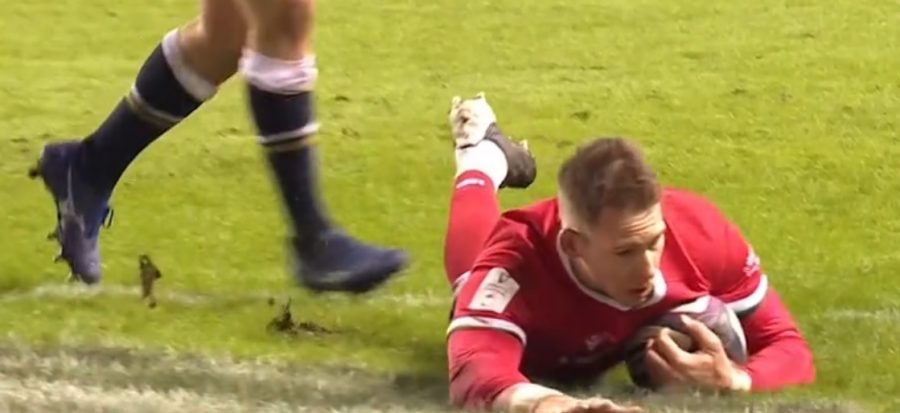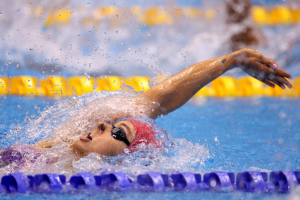Scotland 24 – Wales 25
NEVER-DAY-DIE Wales fought back from 17-3 down against a quality Scotland team to gain their second win of this year’s Six Nations.
In the first round game, Wales got dragged into a knock-down-drag-out scrap against Ireland which left them with a long injury list and the need to draw extra players into the squad. With so many key players out injured, the side travelled to Murrayfield bearing the weight of fans hopes rather than expectations.
And what a game those fans got!
A Scottish side full of flair and confidence and a Welsh side with pace at the back and renewed physical presence up front served up a heart-stopping thriller in arctic conditions in Edinburgh.
Scotland were on a high after beating England at Twickenham for the first time in 38 years in the last round. Their pack took England to the cleaners in the Calcutta Cup match and the Scots skilful backline looked sharp with ball in hand.
However, a lack of ruthlessness in their opponent’s twenty-two made the English game closer than it should’ve been and the home side were similarly wasteful with their territorial and possession advantages against Wales.
Too many times the Scots got into Wales’ danger zone only to overplay or misplay the advantage.
With markedly less ball and even less territory, Wales were much more ruthless than the hosts at converting presence in the opposition’s twenty-two into points.
Seeking to win their fifth Six Nations game in a row, Darcy Graham scored Scotland’s first try. Gathering a clever chip over the top by scrum-half Ali Price, Graham shook of Leigh Halfpenny’s desperate tackle and scored under the posts.
Scotland’s second try owed something to luck – both good and bad – Stuart Hogg kicked ahead and gave chase. For all the world. Halfpenny looked to have the ball covered only for it to wriggle free on the greasy surface and he went to ground. Hogg, who is the form fullback in the northern hemisphere, gathered the ball and touched down.
At 17-3 down, Wales were under the cosh but still competitive.
A driving maul from a short lineout saw Wales plough their way up-field in a series of short drives to near the Scottish line. The ball worked across the backline before Nick Tompkins fine pass found Louis Rees-Zammitt lurking with try-scoring intent. From close range, the winger made no mistake and scored the try which sent Wales in at the half 17-8 down.
Wales coach Wayne Pivac changed his half-backs on 51 minutes and was rewarded with an immediate return. Another brilliant driving line-out carved deep into the Scottish 22. Swift ball across the three-quarters released Liam Williams, whose sparkling try was converted by Callum Sheedy to bring Wales within two points.
Shortly afterwards came the moment which left Scots feeling aggrieved. As Wyn Jones challenged for the ball at the breakdown, opposite number Zander Fagerson ploughed into the ruck. Leading with his should he made direct contact with the Welsh prop’s head.
The rules on head contact are clear. Fagerson’s illegal attempt at a clear-out was given a straight red.
As former England prop David Flatman explained after the game: “Zander Fagerson’s red card was a red card. Rugby is changing and, as much as it all seems to be about the elite end of the game, the reality is the exact opposite.
“While the elite game is the most visible, it is rightly being used as a vehicle to make safer all those games of rugby that are played on muddy, isolated fields, away from specialist medical care and high definition cameras.
“Red cards like Fagerson’s are literally designed to make children safer on Sunday mornings.”
To add insult to injury, Wales’ capitalised on their one-man advantage with Wyn Jones touching down after more good close driving work by the Welsh forwards near the Scottish line.
Back came Scotland. Spurning two easy shots at goal, they created space for the ever-dangerous Stuart Hogg to turn on the pace and score a try, which Russell’s touchline conversion made into a four-point lead.
A moment of individual skill by Louis Rees-Zammitt was the standout moment of Wales’ performance. Travelling at full pelt, the Gloucester flyer latched on to Willy Halaholo’s perfectly weighted pass. Without breaking stride, the winger chipped it over the Scottish defence, outpaced Stuart Hogg (no mean feat) and gathered his own kick in Murrayfield’s deep in goal area to touch down.
Still Scotland came again and deep into stoppage time worked the ball to Scotland’s giant winger, Duhan van der Merwe. For all the world, it looked as though the last play of the match would see Welsh hearts broken at Murrayfield. Scrambling back, Owen Watkin produced the perfect tap tackle. With the clock in the red zone, Wales made no mistake in kicking the ball dead to seal the win.
Wales’ bold replacement of both half backs made near the start of the second half, galvanised the Welsh midfield at the expense of kicking reliability. If Wales bring Josh Adams back into the side against England and move Liam Williams to full-back, it is almost certain that Dan Biggar will start at outside half. Callum Sheedy, for all his skill with ball-in-hand, remains too fallible from the tee to be Wales’ frontline kicker.
Apart from an early misfire, Wales’ lineout was vastly improved. After an initial long throw went straight to Scottish hands, hooker Ken Owens and his callers kept it simple. Wales’ forward drives from the lineouts were a significant game-changer for the Welsh pack. The tactic gave Wales’ backs room by sucking in the Scottish defence.
It’s England for the Triple Crown next for Wales and, while England have been unconvincing so far, a Welsh win would still be an upset result. England have power and pace. If they can add precision to the mix, they will take some stopping.
Head coach Wayne Pivac commented: “It’s a very pleasing start, but I think it was evident to everyone that it wasn’t the complete performance.
“At 17-3 down, it wasn’t going to script but the players regathered their thoughts, the leadership on the field was good, and we came away with that score before half time.
“That was vital for us going into the changing room. The players reacted very well after half time, the replacements made an impact, and it was very nice to get the result at the end.”
On Louis Rees-Zammit, Wayne Pivac said: “He was exciting with the ball, wasn’t he? He took his opportunities very well. He’s still got work to do on his game without the ball, and that’s the exciting thing.
“He’s going to be a very exciting player for us going forward.”
Wales captain Alun Wyn Jones added: “We’re well aware there are massive improvements to make.
“You can’t give a team two tries, but I’m pleased with the resilience, character and pride in the jersey we’re still showing. What you’re seeing as well is a product of the experimentation from the Autumn Nations Cup and the hurt we took.
“Irrelevant of the advantage, I’d like to think we were in the ascendancy before the card.
“We’re aware England had a good win and are back on track. We’ll be back in Cardiff, so we’ll regroup and improve on the parts we need to.”
Alun Wyn Jones added: “Louis has been playing well for Gloucester in the Premiership. I’d heard a lot about him and seen a lot of highlights of him. Hopefully, this is just the tip of the iceberg.
“I don’t want to heap the pressure on him, I want him to continue in a similar vein.”


















Add Comment